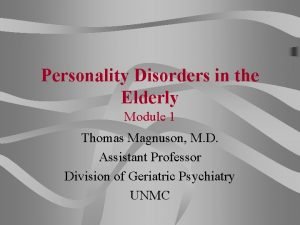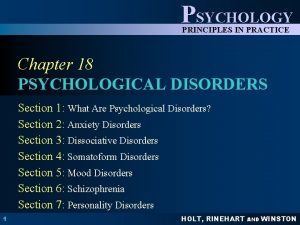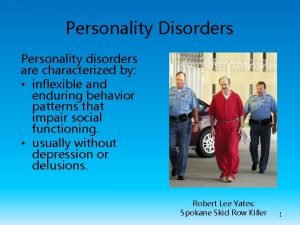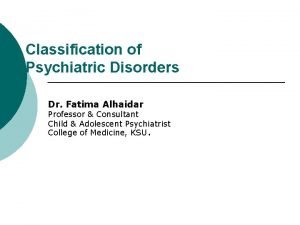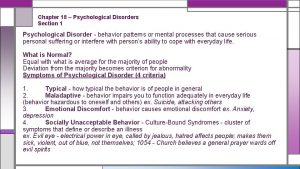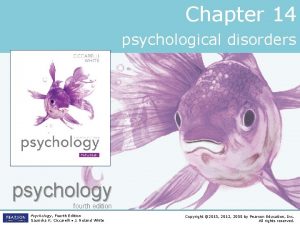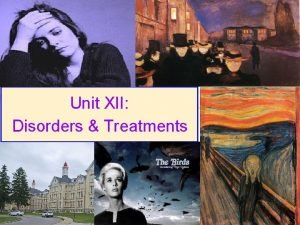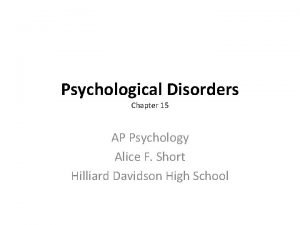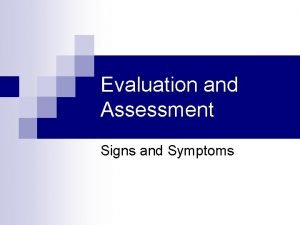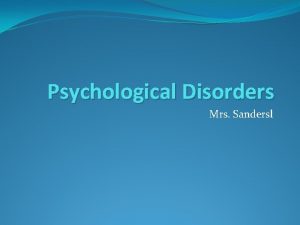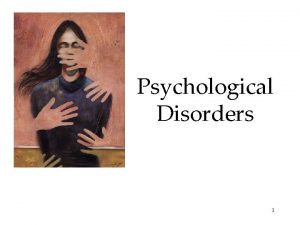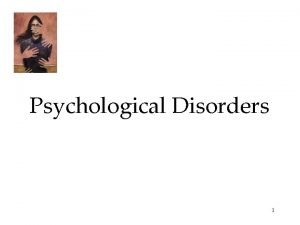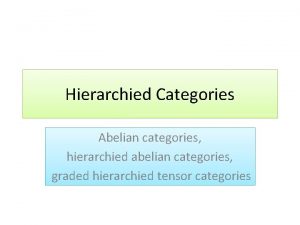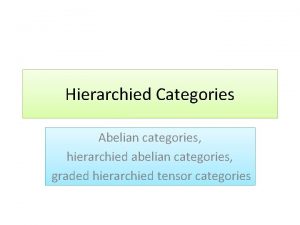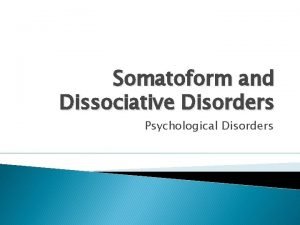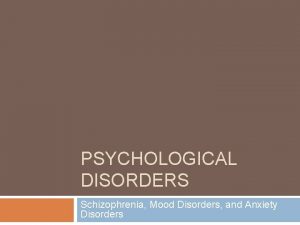Psychological Disorders Categories and Common Symptoms Classifying Psychological








![Disorganized & Delusional Thinking � This morning when I was at Hillside [Hospital], I Disorganized & Delusional Thinking � This morning when I was at Hillside [Hospital], I](https://slidetodoc.com/presentation_image_h/120ea1ee3d5c7c34d91470d9781b2094/image-9.jpg)

- Slides: 10

Psychological Disorders Categories and Common Symptoms

Classifying Psychological Disorders � The American Psychiatric Association rendered a Diagnostic and Statistical Manual of Mental Disorders (DSM) to describe psychological disorders. � The most recent edition, DSM-IV-TR (Text Revision, 2000), describes 400 psychological disorders compared to 60 in the 1950 s.

Personality Disorders � Antisocial: persistent disregard for and violation of other’s rights. Treat others as objects. Live for the moment-thrill seekers. No shame or guilt. Do not profit from experience (sociopaths or psychopaths) � Dependent: patterns of submissiveness and excessive need to be taken care of. � Obsessive Compulsive: intense interest in being orderly, having control and achieving perfection. � Paranoid: distrusts others, perceives others as having evil motives.

Anxiety Disorders � Generalized Anxiety Disorder ◦ Experience continuous anxiety. ◦ Fearing unknown and unforeseen circumstances, they are unable to make decisions. ◦ Become preoccupied with internal problems-neglect social relationships. � Phobic Disorder ◦ Severe anxiety focused on a particular object, animal, activity or situation that seems out of proportion to the real dangers involved. � Panic Disorder ◦ Experience feelings of sudden, helpless terror (likened to what you might feel like when cornered by a predator). ◦ Symptoms include sense of smothering, choking, difficulty breathing, faintness, or dizziness.

Anxiety Disorders Con’t � Post Traumatic Stress Disorder ◦ A person who has experienced a traumatic event feels severe and long-lasting aftereffects. ◦ Symptoms include involuntary flashbacks, recurring nightmares, insomnia, and/or feelings of guilt.

Somatoform Disorders � Hypochondriasis ◦ A person in good health becomes preoccupied with imaginary ailments. ◦ Spend a lot of time searching for serious ailments, misinterprets minor ailments as early signs of fatal illness.

Dissociative Disorders � Amnesia ◦ May be an attempt to escape from problems by blotting them out completely. ◦ Often results from traumatic event. � Dissociative Identity Disorder (Multiple Personality Disorder) ◦ Someone has two or more distinct personalities, each with its own way of thinking and behaving. ◦ A way to escape from a part of the self that one fears

Schizophrenia � withdraw from normal life, and has distorted perceptions and behaviors. Thoughts are disturbed and have lost touch with reality. (Delusions and hallucinations common). ◦ Paranoid: hallucinations and delusions of grandeur or persecution. ◦ Catatonic: remain motionless for long periods of time, exhibiting a waxy flexibility. ◦ Disorganized: incoherent language, inappropriate emotions, disorganized motor behavior, hallucinations and delusions.
![Disorganized Delusional Thinking This morning when I was at Hillside Hospital I Disorganized & Delusional Thinking � This morning when I was at Hillside [Hospital], I](https://slidetodoc.com/presentation_image_h/120ea1ee3d5c7c34d91470d9781b2094/image-9.jpg)
Disorganized & Delusional Thinking � This morning when I was at Hillside [Hospital], I was making a movie. I was surrounded by movie stars … I’m Mary Poppins. Is this room painted blue to get me upset? My grandmother died four weeks after my eighteenth birthday. ” (Sheehan, 1982) � This monologue illustrates fragmented, bizarre thinking with distorted beliefs called delusions (“I’m Mary Poppins”).

Mood Disorders ◦ Bipolar Disorder �Individuals are excessively and inappropriately happy or unhappy. During manic phase, experience elation, confusion, distractibility, racing thoughts, exaggerated self-esteem and irresponsible behavior. During depressive phase, experience feelings of failure, sinfulness, worthlessness, and despair. ◦ Seasonal Affective Disorder �Develop and maintain depression during winter months.
